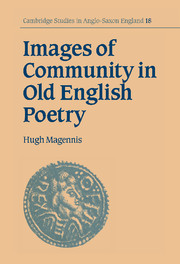Book contents
- Frontmatter
- Contents
- Acknowledgements
- List of abbreviations
- 1 Introduction: ideas of community and an Anglo-Saxon audience/readership
- 2 Hall and city, feasting and drinking: images of communal life
- 3 Hall and feasting in Beowulf
- 4 Hall and feasting: transformations and alternative perspectives
- 5 Personal in conflict with communal
- 6 The mythic landscape of Beowulf: sea, stronghold and wilderness
- 7 The dwelling-places of God's people: place and setting in biblical poetry
- 8 Places of trial and triumph in hagiographical poetry
- 9 Conclusion: community and power in later poetic and other texts
- Bibliography
- Index
6 - The mythic landscape of Beowulf: sea, stronghold and wilderness
Published online by Cambridge University Press: 14 August 2009
- Frontmatter
- Contents
- Acknowledgements
- List of abbreviations
- 1 Introduction: ideas of community and an Anglo-Saxon audience/readership
- 2 Hall and city, feasting and drinking: images of communal life
- 3 Hall and feasting in Beowulf
- 4 Hall and feasting: transformations and alternative perspectives
- 5 Personal in conflict with communal
- 6 The mythic landscape of Beowulf: sea, stronghold and wilderness
- 7 The dwelling-places of God's people: place and setting in biblical poetry
- 8 Places of trial and triumph in hagiographical poetry
- 9 Conclusion: community and power in later poetic and other texts
- Bibliography
- Index
Summary
As with the treatment of the hall in particular, that of place and setting in general in Beowulf has enough in common with what we find elsewhere in Old English poetry for us to regard the poem as working within a shared tradition, though extending this tradition in a purposeful way and also bringing other influences to bear. Beowulf shares with other Old English poems, notably the Exeter Book lyrics, an approach to place and setting which exploits their affective and expressionistic significance. No other Old English poem, however, develops the awareness of setting to the degree that is apparent in Beowulf.
The present chapter will examine the presentation of the types of place and setting which are of major importance in Beowulf – sea, stronghold and wilderness – and will consider the poem's treatment of these in the context of an awareness of the function of place and setting in the wider tradition of early Germanic literature. Such a context serves to suggest on the one hand the community of tradition in which Beowulf has its existence, but on the other the evident distinctiveness of this poem. It is clear that the general approach to setting in Beowulf is highly self-conscious and considered. There is even evidence of the influence of classical models in some aspects of the poem's treatment of landscape.
PLACE AND SETTING IN GERMANIC TRADITION
Apart from Beowulf extant Old English secular narrative poetry shows little concern with place and setting.
- Type
- Chapter
- Information
- Images of Community in Old English Poetry , pp. 121 - 143Publisher: Cambridge University PressPrint publication year: 1996



